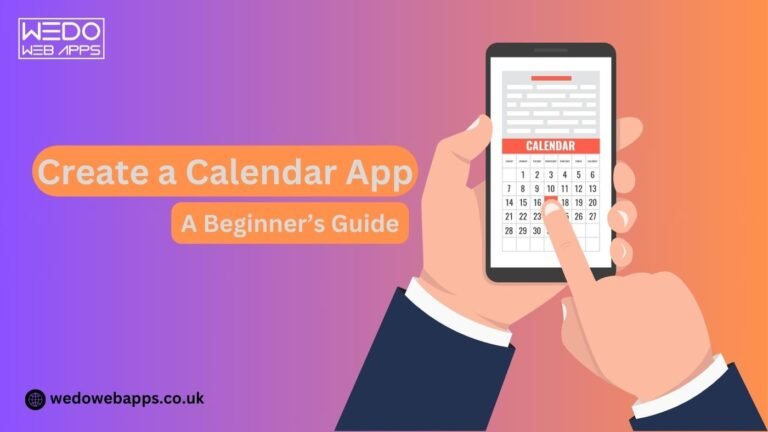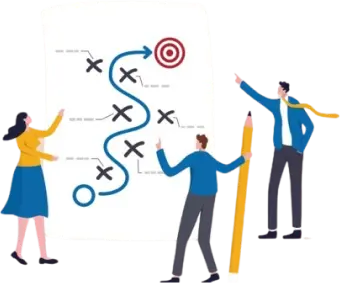12 Sep, 2023 | Mobile App Development
How to Create a Calendar App: A Beginner’s Comprehensive Guide

The Basics of Making a Calendar App
Before diving into the creation process, it is vital to understand the basics of making a calendar. From choosing a programming language to setting up a database, there are several foundational steps that you need to consider.Programming Language
Your choice of programming language is critical in creating a calendar app. Java, Kotlin, and Swift are popular choices, known for their robust features and community support. Kotlin, in particular, is great for calendar app Android development, while Swift is favored for iOS.Database
A database is essential in storing user data such as events, tasks, and reminders. Ensure you opt for a reliable database that facilitates easy retrieval and storage of data.User Interface (UI)
Design a user-friendly interface that is both visually appealing and intuitive. The goal is to create a calendar app that provides a smooth user experience, with easy navigation and simple design.Developing Features of Your App Calendar
The features you choose to incorporate will define your app's functionality. Common features to consider include:Creating and Editing Events
A fundamental feature of any calendar app is the ability to create and edit events effortlessly. Ensure that your app facilitates easy scheduling of events with just a few taps.Reminders and Notifications
Integrate reminders and notifications to alert users of upcoming events. This feature is vital in helping users stay organized and avoid missing important dates.Syncing with Other Calendars
Your calander app should be able to synchronize with other popular services like Google Calendar and iCloud to enhance functionality and convenience.Testing and Debugging Your Calender App
Once your calendar app is developed, it is crucial to test it rigorously to ensure that it functions correctly and is free of bugs.Responsiveness
Ensure that your app is responsive, rendering well on a variety of devices, enhancing user experience across different platforms, including the coveted calendar app for Android.Debugging
Debugging involves finding and fixing any errors in your app. It’s a vital step in the development process to make a calendar app that is reliable and user-friendly.Deploying and Marketing Your Calendar Apps
Deployment
Once your app is ready and polished, it’s time to deploy it to app stores or websites. Whether it’s a simple calendar app or a multifaceted one, proper deployment is critical.Marketing
Marketing your app effectively can help it stand out in the crowded app market. Leverage social media, app stores, and other channels to reach your target audience and promote your callender app.Reaping the Benefits of Creating a Calendar App
Creating a calendar app can not only be a rewarding learning experience but also offers numerous benefits, including customization to meet specific needs and the potential for monetization through ads or app sales.Customization
By creating your own calendar app, you can tailor it to meet your specific requirements, adding unique features that may not be available in other apps.Security
You have the control to enhance the security features of your app, protecting user data and providing a safe and private environment for your users.Advanced Integration Features
While initiating the endeavor to create a calendar, aiming for a product that stands tall amidst the competition is the key. Here are some advanced integration features that can help carve out a niche for your application:Machine Learning
Machine learning can be utilized to predict user behaviors and preferences, hence offering suggestions and automating various tasks, thus making a calendar app highly intuitive.Natural Language Processing (NLP)
NLP can facilitate easier input methods, where users can schedule events using natural language inputs, enhancing the user experience exponentially.Augmented Reality (AR)
The integration of AR can take the visualization of calendar events to a whole new level, offering an immersive and interactive experience to users.Unbeatable Security Features
In this era, security stands as a pillar in mobile app development. Here we discuss how to infuse advanced security features while making a calender:Biometric Authentication
Implementing biometric authentication, including fingerprint and facial recognition, can offer a secure and personalized user experience, a must-have in any modern calander app.End-to-end Encryption
Ensure to protect user data through end-to-end encryption, offering a secure environment where the user's data remains confidential.Engaging User Experience
An engaging user experience is central in ensuring the success of your calendar apps. Let’s discuss the features that can foster a seamless user interface:Customizable Themes
Allow users the freedom to personalize the visual aesthetics of the app through customizable themes, including a much-favored dark mode, to cater to diverse preferences.Smart Notifications
Develop a system of smart notifications that adapts to the user's habits over time, offering reminders and alerts that are genuinely helpful.Robust Testing Strategies
Before you make a calendar app available to the users, it undergoes rigorous testing to ensure it is free of bugs and offers an optimized performance:Beta Testing
Engage a group of beta testers to use and provide feedback on your app, helping in identifying and rectifying potential issues before the official launch.Continuous Monitoring
After the launch, continue to monitor the app’s performance and user feedback to implement necessary updates, keeping the app for calendar efficient and up-to-date. Creating a calendar app is a useful skill, but diving into different types of app development can be equally rewarding. Discover how to develop a catchphrase app for an engaging user experience.Strategic Marketing and User Engagement
As you reach the finale of creating a calendar, here is how you can master marketing and foster user engagement:Community Building
Initiate a community forum where users can interact, share feedback, and discuss the various features of your calendar app, fostering a sense of community and belonging.SEO Strategy
Develop a robust SEO strategy to enhance the online presence of your calendar app, leveraging targeted keywords efficiently to reach a wider audience and scale your app’s reach.Conclusion: Embarking on a Journey of Continuous Growth
Remember, the process of making your own calendar app is a continuous journey. With advancements in technology and changing user preferences, staying updated and ready to evolve is the mantra for success. As you venture to create a calender, bearing in mind the diverse needs and preferences of the user base and continuously striving to enhance the functionality and features of your calendar app will set a firm ground in this competitive market. Happy coding!Frequently Asked Questions
Java, Kotlin, and Swift are among the most popular programming languages for developing calendar apps. Java and Kotlin are generally preferred for Android development, while Swift is typically used for iOS development.
The database plays a pivotal role as it stores all the vital data such as events, reminders, and user information. It should facilitate quick and efficient retrieval and storage of data, ensuring a smooth user experience.
Absolutely! One of the significant advantages of creating your own calendar app is the freedom to customize it to meet your specific needs and preferences, including unique features not available in other apps.
You can enhance the security features of your app by incorporating measures such as biometric authentication and end-to-end encryption to protect user data and offer a secure environment.
Machine learning helps predict user behaviours and preferences, offering a personalized experience. NLP (Natural Language Processing) facilitates easy scheduling of events through natural language inputs, enhancing user convenience significantly.
AR can provide an immersive and interactive visualization of calendar events, offering users a fresh and engaging way to interact with their schedules.
Focus on creating an intuitive UI with features like customizable themes and smart notifications. Offering a seamless, responsive, and user-friendly interface is key to engaging users.
Start with robust beta testing, involving a group of users to identify potential issues. After launch, continuously monitor the app’s performance to implement necessary updates based on user feedback.
Leverage SEO strategies to enhance your app’s online presence and initiate community forums to foster user engagement and feedback. Utilize social media and other platforms effectively to reach a wider audience.
Focus on continuous learning and staying updated with the latest advancements in technology. Be ready to evolve based on user feedback and changing preferences to ensure your app remains competitive and relevant in the market.

